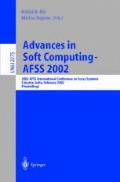Abstract
The purpose of this report is to draw attention to the use of fuzzy sets in default reasoning. An attempt has been made to represent and manipulate default consequences which are frequently encountered in reasoning about incompletely specified worlds, based on the theory of approximate reasoning. Here, the uncertainty associated with a typical individual sanctioned by default is represented by means of a composite vague certainty quali.ed statement. The vague certainty value assigned to a statement is based on only the consistency of the consequence of a default rule. Inferences are drawn using similarity based approximate reasoning.
Access this chapter
Tax calculation will be finalised at checkout
Purchases are for personal use only
Preview
Unable to display preview. Download preview PDF.
References
Benferhat S., D. Dubois, H. Prade, ‘Possibilistic independence and plausible reasoning’, in Proc. FAPT’95, eds., G. Cooman, D. Ruan, E.E. Kerre, 1995, pp. 47–63.
Benferhat S., D. Dubois, H. Prade, ‘Representing default rules in possibilistic logic’, in Proc. of the 3rd international conf. on Principles of Knowledge representation and reasoning(KR’92), eds. B. Nebel, C. Rich, W. Swartout, 1992, pp. 673–684.
Delgrande J.P., ‘An approach to default reasoning based on a first order conditional logic: Revised report’, Artificial Intelligence, 1988, vol. 36, pp. 63–90.
Dubois D., H. Prade, ‘Default reasoning and possibility theory’, Artificial Intelligence, 1988, vol.35, pp. 243–257.
Poole D., ‘A logical framework for default reasoning’, Artificial Intelligence, 1988, vol.36, pp. 27–47.
Prade H., ‘Reasoning with fuzzy default values’, in Proceedings 15th IEEE International Symposium on Multiple-valued logic, Kingston, Ont., 1985, pp. 191–197.
Raha S., ‘Similarity based approximate reasoning’, in methodologies for the conception, design and application of intelligent systems, Proc. IIZUKA’96, 4th Int. Conf. on Soft Computing, IIZUKA, Japan, 1996, pp. 414–417.
Raha S., K.S. Ray, ‘Reasoning with vague default’, Fuzzy Sets and Systems, 1997, vol. 91, no. 3, pp. 327–338.
Reiter, R., ‘A logic for default reasoning’, Artificial Intelligence, 1980, vol.13, pp. 81–132.
Yager R.R., ‘Using approximate reasoning to represent default knowledge’, Artificial Intelligence, 1987, vol.31, pp. 99–112.
Zadeh L.A., ‘A theory of approximate reasoning’, in J.E. Hayes, D. Mitchie, L.I. Mikulich, eds., Machine Intelligence, Vol.9, 1979, pp. 149–194, Wiley, New York.
Author information
Authors and Affiliations
Editor information
Editors and Affiliations
Rights and permissions
Copyright information
© 2002 Springer-Verlag Berlin Heidelberg
About this paper
Cite this paper
Raha, S., Hossain, S. (2002). Fuzzy Set in Default Reasoning. In: Pal, N.R., Sugeno, M. (eds) Advances in Soft Computing — AFSS 2002. AFSS 2002. Lecture Notes in Computer Science(), vol 2275. Springer, Berlin, Heidelberg. https://doi.org/10.1007/3-540-45631-7_4
Download citation
DOI: https://doi.org/10.1007/3-540-45631-7_4
Published:
Publisher Name: Springer, Berlin, Heidelberg
Print ISBN: 978-3-540-43150-3
Online ISBN: 978-3-540-45631-5
eBook Packages: Springer Book Archive

